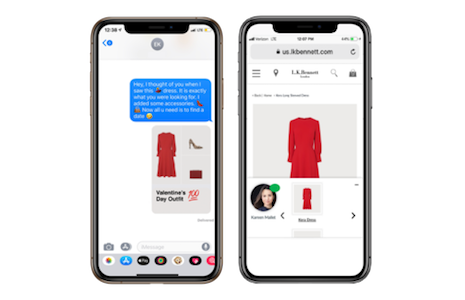NEW YORK – Catering to the changing demands of the luxury business and affluent consumers, a number of startups are tackling issues such as the challenging retail environment, endless ecommerce options and data vulnerabilities.
Leveraging experience in their respective fields, three women made the leap from corporate employee to entrepreneur. During a panel discussion at the Italy-America Chamber of Commerce’s Luxury Summit 2019 on Nov. 19, moderated by Luxury Institute CEO Milton Pedraza, four founders shared what they have learned as they navigate the process of building their businesses.
"[As an entrepreneur,] not everyone is going to understand your journey and your area of expertise, and your world views and life experiences and perspective that made you the perfect person to deliver whatever the solution is," said Lisa Morales-Hellebo, cofounder/general partner of Refashiond Ventures and cofounder of The New York Supply Chain Meetup and The Worldwide Supply Chain Federation. "And I think it’s universal, but even more so for women and people of color.
"The more you can trust in finding your own path and more importantly finding your people—people who understand and support you on that path, to be champions," she said. "Not saying that you don’t need people that are giving you valuable critique, but valuable critique, not just to tear you down. And being able to identify the difference is invaluable."
Social shopping
Kareen Mallet, founder of Replika Software, said that raising money has been the toughest part of launching her startup. She chose to pitch to firms in the retail and fashion business who would understand the need for her product.
The former fashion director at Neiman Marcus Group, Ms. Mallet noticed that consumers were visiting stores less and they were getting their inspiration from social media. Combining these two trends, Replika allows brands to leverage both store associates and consumers as peer-to-peer influencers, or “social sellers.” After starting with smaller brand partners, the startup’s software is now being used by companies including L’Oreal Group.
At L’Oreal salons, stylists can use Replika to suggest products to their clients. On the back end, the group can see data about transactions.

Replika Software customer experience. Image credit: Replika Software
As more shopping moves online, former Net-A-Porter stylist and Belstaff head of visuals Clea O’hana saw the need for a more guided and personalized ecommerce experience. Ms. O’hana cofounded Wishi, which enables shoppers to engage a stylist who will help pick out personalized recommendations from retailers including Nordstrom and Shopbop.
Wishi works on both a B2C and B2B basis. Along with the consumer-facing services, brands can tap Wishi to offer their own customers the styling experience.
Consulting with a stylist increases the chances of relevant products being shown to the customer. Since the stylists are not affiliated with a brand, consumers are more trusting of their opinions, and conversation rates rise.
Startups are also connecting consumers with small businesses and craftspeople.
Morales-Hellebo shared the example of Milaner, a startup that gives artisans in Italy a direct-to-consumer shopping platform.
Milaner runs DTC selling for Italian artisans
In her work as a venture capitalist, Ms. Morales Hellebo focuses on the fashion supply chain, which she says was misunderstood or overlooked by a lot of VCs.
Privacy push
Along with creating a need for new tools to shop more seamlessly, the rise of digital channels has also created an opening for high-end data security protection.
Growth in data availability has opened up doors for marketing and is driving economic growth, but the tradeoff has been the individual’s loss of control over their own information, according to an executive from Identity Praxis.
As the number of connected devices and smart technology the typical consumer owns grows, so does their ability to be tracked, leading to big business for big data. During the “You Heard It Here First: Personal Data is the New Luxury Good” keynote at Luxury FirstLook 2018, the executive predicted that in the future, privacy will be afforded only by the affluent class, turning it into a luxury (see story).
Ayana Miller, founder of Privilgd, has used her experience running privacy programs at Facebook, Snapchat and Pinterest to create a service for affluent individuals to safeguard their data. While working in Silicon Valley, she noticed that while many consumers were not very concerned about their privacy, the VIP users showed a keener interest in it.
Currently in beta, Privilgd is a white glove service starting at about $25,000 that hacks clients with their permission to uncover weak links in their data security.
"Wealthy luxury clientele are naturally private," Ms. Miller said. "And so when you try to sell them a product that is about privacy, they’re not so open to that.
"So our channels for scaling have been word of mouth and just going slowly and taking our time and making sure that the product is right," she said. "That takes time, and it’s a lot different than the corporate world.
"The motto at Facebook was 'Move fast and break things,' and across Silicon Valley that is the approach...With the field that I’m in, we have to build trust and credibility, so for us being intentional, being slow, taking our time is more valuable than going fast and getting hundreds of thousands of clients."
{"ct":"29hI6IiGWJYwpgInb47LTSfLkIlInPPWkKKwEw53nXJFkk5FwNNI8uVYYg0g7HWxt+XaVQMr8uv+RLgf0N6OEWFe7rjtWyI9RkxU5wrCOe0r4yJ5HbsnNuaXa66bDHGsrvJ79NFMeTlsu4BmHHk4oXBI7d+cQioi51hjj8gG8W+BgoqgTGZnIw1Xz9Iz0a1As08KwRrtW6EkdW0UtcHI2rUXZqWauRFru+sROqruJms0DDsUnKlVexE1GVs6mjt8zxL1mL9kCo\/NmXVprSWJ7LuMP8+LaVD5t1DK1ycj7PmB5NI2VY7TGj3PEwExhiprj8Qigg6BHj5Jteq8Twgl6XVVi\/9sYpRUnjruOz1ND6d7riaukfQwyMznknZUnIQGAVIYr5Ikqg5kKU10RiWdo\/B4tVXf8aRmUdALc+mWbWQxoU4jMgDAx3dTkRi5q4m2p1sDp5\/hdPF+jpsAzz2yxYAKb7vHAS+k5dQSEod1MQrO4spWKslJb6uoNgVplCwjzyXSEWTujULtY4RG3kXnSIpjKEuIHNplNy1kLPW4YpxCvw5MrwBycyd+mRSgyMt3LOGCF8KD0cZWuFE7fEBct6F\/zCAL8Fby+uU1HrTcLoAFHzHJeFoqtReHuCSTNpfIuAsSHXdPcw5QTw5cbtLEnm4BrSaji9Y8yc9QGwlSBAM8aOao13qbqtfO4qLAs6GIkUgMN2QQlGcoqrSuhRmmAdLkr9mmx56sLmhxxXDcK1OLvdEUq0UNiJDjmgSXe+poXnqmCiPLyEwjjPNfsEKUlt7IQg7Qr4F2V5McuujiBlZk1km8fecOBtrtB15sSDlrBwn4SYbfoJ5ZSJh4WbG4dmaW+Q4VPkOiwDeg2hyEvkIGFAA56G5n1gAxt\/b5z3eRd0Od5Js03ECBJvI3pZrQdR2B\/hSzFDsrvwJOLF65RFCPjXx5WaSLmTKrOvs6KtRcOs+EzF0uXNxnFYACfD+IUX6mNuwNRfVFv1qsAV+Jsy22SDBywJzlbXdXmpVu0WEmIGKeXjefJ0lSpd42xLsC2NDJz99SPxyhTzMQKCOU3znYuzYPhZ1QavwSYQeDxVV3pJ93ER6aECMlMumwzwgQaYhetC+Gd\/UFapHWHF9DbB9AIuHWGuPpwt9sIXZtcJYyQqHxcE0\/mPxH7sFo8u8ZG2uUWhwy+z9PNBTYIzIAmaZV0HmFi1z41W5+BClN\/KxgR9Xv4ooai6aJWCjx2VVn0tmWr1Rvedd5T5MKs\/dag31YSlnhf3tcfHANIVEFGw+89\/TwvsOtoTuw437xYYCdTc7K4PcMXLq6KdXwPbBHZciUiznnjxUk+S97ROooJK3l2JWkc+XG4hfsX6NiGsXmKJq6E5OguSbDeeVIRj\/tGjTWbqhpS+VDUriMjaXmt5W\/4Ae9vT\/wbH7F692q77T2yQDF5I1C7vT1asnhFhFHAqThmUF4uwZKx4oHvPBQBD8CCZU9qwkTo37EeCBgMDkB5J9NKK7dIhg72Gv9fXQKMfrZaWQVvfFxf6UH1Yc5e371eEQF0yWh8OZsiVSj7\/3ZnZUtSTJcmAEz\/wuTRWKMgkk+pUrRM1ZTYdOnY7gjI490YagYxYqmvrjiZCWOO8NFnxNIGO+wu5rKE7F3DPzMmU6uVtBDBe5OWSIxYCZNPnKhOoHF4Z0fxkzKXIU0E2hGMccpsu+fXCDKrUvbii7KzHc541I1AlMXKaaN3gRcnak7Gfh+DF6V3HqT0Bil\/hE6GcFDVDhXRlBSi51lcvLIqzsT55Z3PrV0Xz5wyBdTepX1xQpvDxjyvHm2z4s0Cjx8Q8Keps9YiK27E5+8RP3brfxCilVfw8Vewg8R5HRg8ob1igmfJJF5Ju5Ha++0VojJEZeKDWQQrPu5iqJiLWYrlYlYcrNgcjDl1WBCCgl+k+wJOVts3uyM8SQrGMKIki8CtUCA1go2bVav2YLb1Kz11ccJYBDihtQgYYXXkPW+MAsiY1KaR8AGtibBwgg+9Vey4P7MytxhlauwoTOYpTAP8S8mQ\/l72NKJmW2R2P3wkFkqGOICP055RD2zk4KB9FvmnEA+cenjPEB71D52Kg0f3Z+nbzJWx6kMiCJdgsAtcX8EyUh21H5acPFd8q\/3eqxyrataYxeEBkt6EMKEtbLmvIUTKdRLME4jKi8jl4THtiDSwRgb+T2P9AVuh9cFZEkDydbYY+6+ExrH5qtXJu6O78+s3k0BbJV4zEitG2KhiGZG2R0thtMxdEfDenkQslRp6m+K\/ccRAsbfj3LW8oniEoTNewn1KzKKdaF+tiVDerCYoVT0uP5NLKZBBpcUtmaZEEfh7Lb3Kfe+UIswBCiU2M3U5JU+7J\/vTxJ9+PvxY3Yjm1GQbD3e0TgcfP5x10s18TcFgp7Hwy5qQgy06V5xe0LZg6Sx2ddBtOO98O31tlS4mH5YDOgFv9y0zSIVj90u1N6yWlaNqMK3mDL\/Xe6I8eaEveRFN79ihgivXBIeVuPfXNuz6+AvkF3M6OE644GnZXEyd0rlKoPdGTcLuNWPQ+QsickpYcY61B66EhcjuWjV4BZW2oUZMcfv51ZF3bKbN39UF1dTEl7ZXfwqVc8t6xlFiKwpYIPRVt50eUF3VTJTJK72KVcb8ip30Gcv29y6VPkBaH4h3\/ebN2o5csRjps7iLGipJWMPU5kJ6ZSh26cXWXviyWbHzV2CeGuN+L7RWFu1ADuiZj9pYxG5kT35eo+Gc\/RKujbBuIdsD2mU4jnH3pgPNcnOiRjvsQcS2D5W6AoLJmzDJ4YuU\/Hvk0GgsCvbIVWTckqVTKqPDDZP6XEsxQTv0GEJOEUcfOPt3BlpsBIfCqPt2qnL8beQzseRZOuVYS4Lf6OIf39DFx9ZM0+CnkdbtfFXn2abSoxnX+UK4NPdWkaUGnfaQyJtPqA11BOiAmw2YWDgNQnwS3QVh4cQrSO2XhGeh9E3x7IXiQ6H5JzFEVhWFb5qKg8Ckm5KzWqzAZoomQW9ZQ\/7etAjyrlYLW\/FkDlEA2irXC42PhaQZTRsP7OQ7GIaX8c6swWSthvA0CUlqbLyBS4JIBNhTcIRJB4t6F4Y5JzB70RhfTHmHCPrHPEXYI02VmxeE7tvXkYqMN9aZl+wWrxrCs+0dzOHhRCq\/yeik3gXmuyW\/95KRZ9amoA3hSDl6\/WN3ELN3WXajfZgMuZIIILv+wPoiRM47SOSaA\/cMVll8Ck+mM5hFkFsZgYNNvr9ZAs1VsFYSgrdEr5rOuEZ0J5OpUpiorcskQr4Y5jx9pNxUCm6qEGa35g81rouPBrPSxJEceZBhtX0hHXtOJ\/dvzGKyY3QgeTWI5nsDviNxUsnMque8QU8Uzd1hFqzOOrXmxOHvvRPnVf8tDRgRgh2X6V+PfMZph0Qz7fQAh3QZmqtCPq\/B00EOWLeVhOz2TOxJm2z+WUXMG1vrune2cU5BMGez9vdIWTuNxeZXV0U7cWdN\/VFLj+CsuW5CWnEarwFg864SoBYItxvEQrgX0aXdBlRrJbeGkDGyGe8Bwf9Iagtlh4zJU8F7oHUxCJhqbM938xqZj7tzmFiUnpXrhNjbJYH7tEpe2mZkgxJ7Su3K6TkGkVLCJYWc+CV+iLC0xmPq4cj+xhwL+x1Plx4\/mST3svnFAF6CdsD5QTVmQtNNYjSoGobo2u6oAzx4c64edO+15Tabqslt9QrY9tHo8kn9daKo9vgSQiuNFHNejxVScTwkGKq7nQMF0H3jz0iIfusTStMfWVpcJy8L+o4TWcnFnPZn2u\/HimSSx9ljTDH0sFQuvhqX4sDD\/A97hwMCTny4wMtKY8Cu6+V6xXiiqiS11HFQbSWb2nu1kXUGaiewJHwfoM\/6kntQ2aJ6Nq+ZUMAlxwSt3MDC1RXKX1RQqz0dKR5XzIYMXeunMFtVIgdVuQc+5hqyb1yYnW1m0c5BbFBZ7+62t2McU97PbcdGxeE3uVSnC4WempDhZUTgNc8ozjEbDZEUC\/pYGvuy5pjFwC4aCQiYNYZQuU5\/eX6zk6iNOprT7fVGbYD\/4e59SXlJzEeEQBlUwfIEI70xHG9WuoNAPG9kJwngV6cFI23Nz28nR9+kO\/Ji+PbqZ4UY0SGjhuOExclak1xGjaDchBjGXxQl3VIu\/bP48vioXm5b9juBobFgKYz176q5OTtTWLm7iJEQZpylN93saQAbyLrtGI38V9T5ybdvV2FehBTSE1qJt6p1Otxt7i1yM46\/SUYfWqf0yvI0oo1KR6wQK4JgaJqpHWqS+OuTIGVq\/2LCBonOFFWeaIWYhFD\/X7b0BTls91erMhreLL2HgEMSrjRsLcd+sjiyehKlC+wNgZS2tX58kYttiyyhQm0KVRZINafad0omLYiQHTm2\/6XNgr5CX4Jz+d\/MzGAqVD5LIZQ3hLm1eubaIUp2\/8KoYW2h6Z0R3DCEUOfo6cKJ\/TWGLOhx8TyyyCrYBmnBzTOboJAv4pgGKfSNEhnkm1RRwcDXjDKA3SS9hAbZewJSUqqJXhGBqt1pH49KgoJcpGBYdGOSA4UwhU5GqxzqBYk9nf6B1QeXPc9kfx1TrSdsXFQBI0bANiB3PW5vgUiOPSUiiyYO\/m57axNzB2L2nsfo25aRVAA8U6O3rbv9bRXHHxAx5zM8BbjdNH20n06mQD2ICMLnxrxTSSIWMdJAHXqpfDKlKKHbO+HzE9kGnYSqVf0WeSVwygkINor+lV3NckClnv2OqXxHowd+aTU7+JDmOjcHy9duQsfd+Zdub+vR0kkz2bddhhP3e8+6UwdT\/8I740exf7PEj9JFBsBjXmt1Lhl7wkO\/+w1MJ7Xc3rhREqXAiNm3jQbzF32S3rYwg6grF6HVxdh+DxqP97+wk4LF9VRoIM8j6vXnsqgFSYdA1SxohDw\/dxD7+o+xSaNROtHB4bX8g7G29GxNYDVrFgRU7lmz0lvuuNQpBJlgx5RcJQnT8iZzEK9SlW0iwiN6n9AZvhmmu2C5wZfQePsXvOGe5DhfIBSf0t+yXxjClYlR5BoarzL\/hAeGzkZQ3kmssux9SD6clUpBdBw1FHkJzkB14f+5f1y1Ue3Ay\/uHCQvyew5vG5aISaB6fC5OQ12Mo4XA+BH\/\/3oc+GzCHx4C1\/Yt3J1HlaFO3SSZ+J3gB9bbCs8QTgeVZDt7pYJeVnTEIu+y3jWcNIMqzoyWdwm09Ax01oIJ9tZOEFwNbjE\/3974fFpv5hUs5R8oNjlKqLR3bl4wcp\/YJvsX\/sbYKDWpJ4iA9C5GubyZ5rL5+1H6Nb6rFS2fyZFWAGb\/\/CirbW\/TFbF5Ke3KMse5hs8yElAHDUc73LQFM+Hyc2E1tnQMLSkmpLAbG9NTss7moNmFWi\/QQxlF82+wHLSUQZcIweoUQdkOiMaJTp4BocZA5DIuN4fEPxsyK\/Wmh06knwjpsJlCg2qcs+Tj6YEBYJF8qRORz1jIvaQVDo2CfXyLvKlw4v1EbhrcZ7KxogaoTiyCnMmoJ+fbFIQui1v8JnjWuSvBu03J+iVzCQ3G8JU3\/kQAsoE1OSMAYu1R5YhAksujYCcAFbdbps7CTu+Z+aGe91ARI4Y4+GAGC6QVC7DV0cXVZMFJi4tl4LqSnjU2yijw0NemnCtmdPyiqvRYMWco0YQ02NuGa+oSdbK2Pev0nkOdu1TZTIjXwsjU1l2VCWsjA6ipCmFL69LSHt4W6kzOpXEkH6JESR9YGlFkRCjZEprjEdHG3ZEF8SNHJ4T6Blc332heIleDQCH52KYRc8sS6zFee1cwUbRqcuyZq8R1hMHGmAkfgsCtbTZkM4ob0e\/3I4F5tlMBwX6BpoP1YzAaPh6YqSKYE7UC0rEGMjrWFqv1fakbTY1AvEMGs1689eBnG8jpWWiiz0hlra3s5r8a\/2pApktfzdFwJQBuUjIV\/ppeptLj3NVAjzB3HWpi8F0m25LVjgkAmY8yNhUOuC\/+6+r3ImQG7oAfPJCFlVfRpA\/k+g5dctDmcKJ+IYmK4Ncq78uBJQPChGXP1Thi0ZDKbibwRGPJzqP657yq\/nAYGRyT8+E+LB2D2\/fURCRry6OVWGmw00gfjh\/qrmARso49ZAeY7ELqg95Qyyn0Ae\/352O4PyXYvletOVCM1apvBnSWPptGyrR2YRRPDVeDCJ21jKlc4VFHDtY+O24Xs6VQEgiVuU9OPGpbq6+oDphckG1bxJ7mTWJ5pGEpjlTTBwSwiFvhb+RHtA\/Lx6kjWTmp967NeI\/rd9qg57mMaCvIdCXalz+fgZy15Vgz+VvIcKHmX0YwbEE8D+E7tNNXXXkfXoOlS6ejlShnmVSa43YHJY\/+kP8\/jxA1pnjlkbKIc5aygWNm5ZVWej+1Thed1wK1P68+on4hk8XETViKpZ4zmlxjEI+bkm\/vwRIX6LqlUQ1as6W3S6r3ArTfFf4nLeqjy+GDeDpn370LGCXVgLOjwIjFevZQGNpwPzqndMqyhIjCeZYZpXvVYqf0OgGAxm0GUFT7mKp7qfm2\/jV6el+mHtgu3mLxaGBz4dSDkDvUN7nxoTvIfCscLrNJfWZZvrRq6FYoZImOPmOc6XUhATWjYGgpJ2oriA5P2rReoE7A6yi2FNH\/O65fRHH1+oRArSSj1iK634+OcWdtOULBi60CWPQsDP8Yt3CFeZspKDmcMuFvZMBbFh1sheDkVeWZQU82FbDzopZSRr01j9h0EV8jk\/1tnZhkr08SPhQKr6A\/cTMrm0mBmMv+m8rNvURqv0s6niRvgDDYyDwtLVm0GTdnP+S\/+lvrpvngQG8zHw6jZnDkx1Fjvrc4WSjxUBXzSuAIdFNP0a9nD35+Rn07ldS+4WrFz62V3nka1XWgl72rvd0vYiXXy4PJKiqEzocHWOm\/gKFppjToqugBh9Yuy6UgXy1sh2nhgaP1iLJhbDNMjckJm0qmWHR2As6s57u5CGt2htcfuGeHC02SAjSROnVQGx9\/3uDXTCOy4CX9Ig86xcZel0ytDqzuAEbo0dsKGAbYU2RO1gl5zRAuSuQTIyWE+pjqcJLVOUFwqw2GVuV9jHqVLFY\/CpC2JBmbYLrh9FfapEb6GAxD9tRY2tEU3GtJWB26IUn+LZgmo7L68jF2Hsv2HkVOSujy43UG+JoCDBWya9I0TrxNpeyV+4EFHzVGi4ou68183rVMcOeOzKPQO9guJow9PFviel8Hm6Hu1zttiQMKum+avFyOX86D0auPgmyBPtE9812VF2tLdz+ij8IhgU7VhFzSoeLQwQlHb6QzsBDLVhtina0z9NwZYkW5dPwL75bldkbC3aZXqO4h+EtAEpy42CF3xR0M9QAaHxEeQSPAtDIFF4sx6ppZcWzltRbhhwutpsd4Bc17fZFuecN2Xk6UWDDgH6u9rI\/4gKg2yvkiAF8NYJEiGjL8IhcOaVk71J+BXjeja2VFvsxwFx7hw9nUtcpwSCe35JgM+k6+tVl\/tbe1A1jaAwzm1uOb9IGi+CrorxneBr1LRQ1Ziyd6cdHFuJ\/9WhmtqzsJGvcKekz\/dpBteqUE2k3Jy8RXXM8R3iFYt3Y7samGRnq0ZaO6G\/cJl8dfCKP\/pmqDpprWfOhUcgeAi7HeKYBE086BQV898DXyNe0mlJSTokZXzj4ZcDV5y9Ls589GsTMr6d\/\/NSXd5ssaWKhAiEudbnEFlmEqyvofA8Fndlu\/st1XJU+6nvNsuiTrD55lOIBnraURO78oedEAksxm2HF5Qd+sUY\/Pwcgt80AuvWxgW8riU3OemWqvyn1aEo4C0rBnMQrWqIq5kAmVgTiWUtRRoYRr\/CWaueA+l7Ur53UVhl+3sESCoV+EF+xru\/OSNmhD2ZTHV3Az1ZnEGHvBTMKEIp+rG9BOQVWD\/hfGk2GX1sa8oZ1PCWtYab9gnQBFI7wYqwOyw9wWwf0hroNVShtbZ0HDSjCA6OeS07qDJVcIYlETo0bPhhMf5OyeM4xjTBxZsWVy9NbyjsDhQZ7ikMcnDBjPS7OBjAUVKCOB1eaXjbSjoUSFlgZzUC2t\/nTO70l++hqbYTOcf8wJ7DwLuVPSi13HlQG2YV9MvChM\/aDo9Awex9+Ef6cOBk+4rwZD\/OoaUBDds2rCom78otGLgz73Ddp9X0FceDVDr0CBZEG2wGX1vJr+N2dptXHndpy11IxU6AbYcqnw+0OfZR46fuYmQe3CRPDWx6uarp01rgKYGShE575ZplBevlOIi86M2\/kXYrSZp7YLejljflG9C0PO2U+bOCM5iThAGj0D4H+i3i851885YSYGuXvZ0InRAYBeTcJZ1NCoL+8DGR+0PA8w9WB7xGlS1aQeBJcExLkDKMhYTaaTtLZayJ1JJ+ZYJu9BSGlTwPpHQHZRjYKJPkmKD3H0B0k3HEhdugXIxnVnqwsDmTcF8bZqZhOc0WyFuOnz7ksCR9phOUdVF19SCj+6\/Quh+VKWV9L5u8JjreXKuZD5b0QHLEjZZF1dlXioW0CK16vzQaxjmzoY6RrX74NnpXUmMW3DwdXAaT9\/PyWsGnOV9xfaFzSczCRhXE+1pxsh4R53Tuq2aaxfjg8xJRVhPRiiP00TitiV1O0uUi17pTlASMgzGkoVsOVrO7BpHkUT6lzR8qCEZUU6nH\/AEzKy+zfZCSpdBdhFZlGDDgLg5fg0VjhxiL8SzPD1thmEkr58420+Tpnf9goBdgKYgRwWFrTlH4TX+rD88osHOfYC3LD+3QKLxoMJIErBhbh2DJcR5gCxitx3991aPVLSn6HH3eMxp8hzWghsHX7cGOA\/tmYUJLNy9qwa1Juw70n9+1Z6J\/Jg+fC9aDUgW96n\/eCVHSSK5EDjn6xh+O8Vm3HkIaV7H\/QEvZEK2BcWX0TGfD2QnRxwU+BBN+IBYcbkYhQ6xowd6yBR0U6M1\/DvcOS\/E6sC+X8WpoWcI\/QbVZGQysqahS1sO\/vTRG4K+6U5o6VLR4uo5BgugtvXmNnbujsV5sk+uOGEwx47bn9p4frA\/lk6BzA5dBvKe3OMqLFzlTN8dqnEjqj2SDGQSKTOGHW4Vgbi9gWlNYXPPGgnpr6NrAtaUTF+KJPRSOYNm0AZLfbBegm7s4fgIxPKFDepFCIbS\/dgwUC4m4Ma3b6+i+lWYpfeK0ZXiH5ZNW5t7YA1+hKZdY\/QGOTAaztma6\/4rA1u8r0s7QQKGDhlJcm0VUhiYU3PKigbFkAlr\/PCkOlj77+sgZ3htfOu7vzrQiPjbecCJ6fuE+spc1ivJQMY1ZFbELDbHADFhyJ1O\/vnnaoLIIZ4ZVnpJgZlRyvTDbZTWhWqdeKu2IMAgm2vvi4Afwcvoo4SC\/f4WZ50jUs92XpgM60XKr2\/jhEcgSBl8WbGpEzl8S0AghtX1YMyrRAce7rMjDKXk1dDfcY4c+DI4o2eE3biEphO9kgVvAE5UcdYbBRmsmmJBDKtraIWF+5oanvU2r8i4FMNNkrkNhikTIcRuG+48QzxeRuwuYAcTMM\/XGVjWUEs2ATZmt+cS5BqWWHBTyXFCpDtEeSPRpMN+G1SBrWyyR+HsOfc3pvuOyhTMnaBh97FxfZL8xtfTE9X5rQe+vVjLBZtPruPKlIPW+fI+JLPL1xABRb9+PP1oNToEJscDmC2vXT1by46n5htpA3iD+rzliM1puNrMn67sY3YLMpWYIfRFaE4ObM459ny3dbaG+8NdWTEKq10R8A6FXfNVjc0VVKl6HkA9lr27NcDyJ3ZdVkLythqfxbD7VndJZRrFU2i3foBz8zNNVCQXRyMI6qCgg0EZPnTCkytFyQ\/b\/RCaJaOhtmfBAH0W+k8FBF0YYHj\/bZU6Bp1deJoLyVOgKrBcBycdKxy995JdzM7jjO1DX65J0yS6iDyY4K5pLy0dXd+68YHKkc0DUnoQ+TeNVl4AjYy2sRBtw5JTmr8o1QSFNdbLONvfI5krTzhikTSPkoYgryQ+KiihMZCj\/S1BcodQQCMTtSgcmM7isx9OXQxrfJKnJiqsT40N6LRPXCqSPDwjbctpVx6ZugA+jbwXow9hUzPa1MKxGLysaRJbPRJCJUczrzxgSlm6xzuyfiGKq+nTT\/zCUlsk8i9oSQGgacmc6vrDDp+ss85Oj4UF\/gWiGaQmpncamEhr3oT7AnA1sC0P0YboPxbep5TgOohEJvBYftnOoJv3p3yH3hV9ZwCs9ZyTSpj6\/Gv9WN2EnsYUdTLasHZJtvwV9BBJQn9Wmwi6sXahxDbb33S47\/J014SzJKBSAFqOjx3s5zAOTkqfzAPTUq6zV1K0wWV1gL9550czHR6tqqGnnSLD\/fYaqZfOKfP0JFjEDADeUPHNrECj3Uo56q1XfFinSuhjTXkSwDQpy1noLtK4D9RzM+NsVJxwBAKnRpmBbgI+Sbq3Ln1mKTEnoGUNT+QYwrjXn5QsTLwUKHNvZmgoJa+GOO2+zjvwD4gZs3jNTHIRpUCtYF6ifHDFqAkOzdEiS7NCANQTdS7IUw5YDwEignyC5iEVKfkd9E7WwyT4BGe1XRY33bO6MU7f2XgdRynjam+NeB5fumTiasC\/ZUz+VVdEVpF0LOvbrROOGYPtiu0v1sc7MIjr2eovaSqtf4wNRCr2wIX6zsSTKYsKKxCnPausnVCOEXwv0AD1Mey4Ueqj6MK85P8oL9IAV3r0itly417wIG90nbxXIFAhXwFRBTBMLTUwFsCLWMSOy2M7t5KQdLg5yEd1Fq+mc8yELS9c\/iT4NNK\/wFZmPr4MlizMMp3iReHKLK9TLvJ58rx4LD5IUa0SuCrQ10Xa6Uys89rwnA4cOCsnL0FljGmAHGvyg3rIdkjzgUIMoh0pM63XC2wwbNhuiZeRFq3YJM02bMbiu\/VuMY1ZSNLAyxkWdGEqNwPRblwDDSp9gvhnj6CsUBuqoQpcAll5P7HINQ+Rv9jOrVyNBV+n39DC4Duca++0n5tOszQgMO07jYFLs+sw9ODc6UE6IA\/ye7fD5nrnOxDxEe","iv":"44bdeaa7dbe3b3cb60b2865262c10d6a","s":"307337788d766ad9"}

 Wishi connects consumers to personal stylists. Image credit: Wishi
Wishi connects consumers to personal stylists. Image credit: Wishi